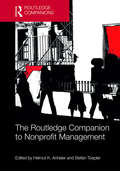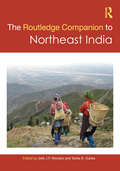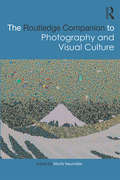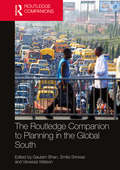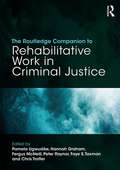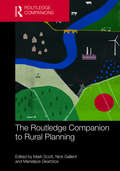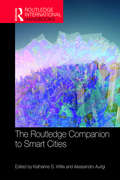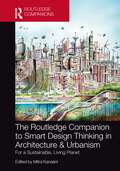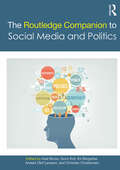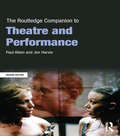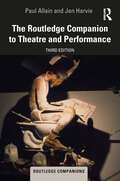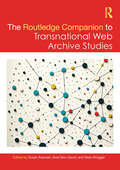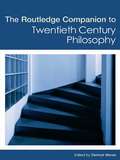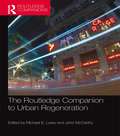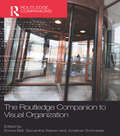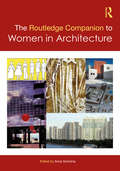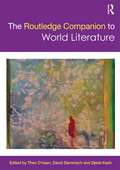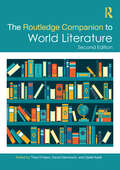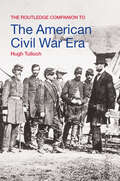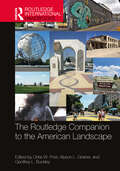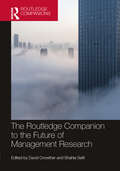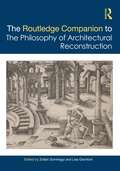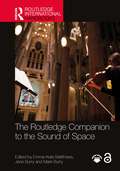- Table View
- List View
The Routledge Companion to Nonprofit Management (Routledge Companions in Business and Management)
by Helmut K. Anheier;Stefan ToeplerOver the past three decades or so, the nonprofit, voluntary, or third sector has undergone a major transformation from a small cottage industry to a major economic force in virtually every part of the developed world as well as elsewhere around the globe. Nonprofit organizations are now major providers of public services working in close cooperation with governments at all levels and increasingly find themselves in competition with commercial firms across various social marketplaces. This transformation has come with ever-increasing demands for enhancing the organizational capacities and professionalizing the management of nonprofit institutions. The Routledge Companion to Nonprofit Management is the first internationally focused effort to capture the full breadth of current nonprofit management research and knowledge that has arisen in response to these developments. With newly commissioned contributions from an international set of scholars at the forefront of nonprofit management research, this volume provides a thorough overview of the most current management thinking in this field. It contextualizes nonprofit management globally, provides an extensive introduction to key management functions, core revenue sources and the emerging social enterprise space, and raises a number of emerging topics and issues that will shape nonprofit management in future decades. As graduate programs continue to evolve to serve the training needs in the field, The Routledge Companion to Nonprofit Management is an essential reference and resource for graduate students, researchers, and practitioners interested in a deeper understanding of the operation of the nonprofit sector.
The Routledge Companion to Northeast India
by Jelle J.P. Wouters and Tanka B. SubbaThe Routledge Companion to Northeast India is a trans-disciplinary and comprehensive compendium of a vital yet under-researched region in South Asia. It provides a unique guide to prevailing themes, theories, arguments, and history of Northeast India by discussing its life-forms – human and not – languages, landscapes, and lifeways in all its diversity and difference. The companion contains authoritative entries from leading specialists from and on the region and offers clear, concise, and illuminating explanations of key themes and ideas. A hands-on, practical, and comprehensive guide to Northeast India, this companion fills a significant gap in the literature and will be an invaluable teaching, learning, and research resource for scholars and students of Northeast India Studies, South Asian and Southeast Asian societies, culture, politics, humanities, and the social sciences in general.
The Routledge Companion to Photography and Visual Culture (Routledge Art History and Visual Studies Companions)
by Moritz NeumüllerThe Routledge Companion to Photography and Visual Culture is a seminal reference source for the ever-changing field of photography. Comprising an impressive range of essays and interviews by experts and scholars from across the globe, this book examines the medium’s history, its central issues and emerging trends, and its much-discussed future. The collected essays and interviews explore the current debates surrounding the photograph as object, art, document, propaganda, truth, selling tool, and universal language; the perception of photography archives as burdens, rather than treasures; the continual technological development reshaping the field; photography as a tool of representation and control, and more. One of the most comprehensive volumes of its kind, this companion is essential reading for photographers and historians alike.
The Routledge Companion to Planning in the Global South (Routledge International Handbooks)
by Smita Srinivas Vanessa Watson Gautam BhanThe Routledge Companion to Planning in the Global South offers an edited collection on planning in parts of the world which, more often than not, are unrecognised or unmarked in mainstream planning texts. In doing so, its intention is not to fill a ‘gap’ that leaves this ‘mainstream’ unquestioned but to re-theorise planning from a deep understanding of ‘place’ as well as a commitment to recognise the diverse modes of practice that come within it. The chapters thus take the form not of generalised, ‘universal’ analyses and prescriptions, but instead are critical and located reflections in thinking about how to plan, act and intervene in highly complex city, regional and national contexts. Chapter authors in this Companion are not all planners, or are planners of very different kinds, and this diversity ensures a rich variety of insights, primarily based on cases, to emphasise the complexity of the world in which planning is expected to happen. The book is divided into a framing Introduction followed by five sections: planning and the state; economy and economic actors; new drivers of urban change; landscapes of citizenship; and planning pedagogy. This volume will be of interest to all those wanting to explore the complexities of planning practice and the need for new theories of knowledge from which to draw insight to face the challenges of the 21st century.
The Routledge Companion to Rehabilitative Work in Criminal Justice
by Faye S. Taxman Chris Trotter Peter Raynor Pamela Ugwudike Fergus McNeill Hannah GrahamAll the world’s criminal justice systems need to undertake direct work with people who have come into their care or are under their supervision as a result of criminal offences. Typically, this is organized in penal and correctional services – in custody in prisons, or in the community, supervised by services such as probation. Bringing together international experts, this book is the go-to source for students, researchers, and practitioners in criminal justice, looking for a comprehensive and authoritative summary of available knowledge in the field. Covering a variety of contexts, settings, needs, and approaches, and drawing on theory and practice, this Companion brings together over 90 entries, offering readers concise and definitive overviews of a range of key contemporary issues on working with offenders. The book is split into thematic sections and includes coverage of: Theories and models for working with offenders Policy contexts of offender supervision and rehabilitation Direct work with offenders Control, surveillance, and practice Resettlement Application to specific groups, including female offenders, young offenders, families, and ethnic minorities Application to specific needs and contexts, such as substance misuse, mental health, violence, and risk assessment Practitioner and offender perspectives The development of an evidence base This book is an essential and flexible resource for researchers and practitioners alike and is an authoritative guide for students taking courses on working with offenders, criminal justice policy, probation, prisons, penology, and community corrections.
The Routledge Companion to Rural Planning
by Nick Gallent Mark Scott Menelaos GkartziosThe Routledge Companion to Rural Planning provides a critical account and state of the art review of rural planning in the early years of the twenty-first century. Looking across different international experiences – from Europe, North America and Australasia to the transition and emerging economies, including BRIC and former communist states – it aims to develop new conceptual propositions and theoretical insights, supported by detailed case studies and reviews of available data. The Companion gives coverage to emerging topics in the field and seeks to position rural planning in the broader context of global challenges: climate change, the loss of biodiversity, food and energy security, and low carbon futures. It also looks at old, established questions in new ways: at social and spatial justice, place shaping, economic development, and environmental and landscape management. Planning in the twenty-first century must grapple not only with the challenges presented by cities and urban concentration, but also grasp the opportunities – and understand the risks – arising from rural change and restructuring. Rural areas are diverse and dynamic. This Companion attempts to capture and analyse at least some of this diversity, fostering a dialogue on likely and possible rural futures between a global community of rural planning researchers. Primarily intended for scholars and graduate students across a range of disciplines, such as planning, rural geography, rural sociology, agricultural studies, development studies, environmental studies and countryside management, this book will prove to be an invaluable and up-to-date resource.
The Routledge Companion to Smart Cities (Routledge International Handbooks)
by Katharine S. Willis Alessandro AurigiThe Routledge Companion to Smart Cities explores the question of what it means for a city to be ‘smart’, raises some of the tensions emerging in smart city developments and considers the implications for future ways of inhabiting and understanding the urban condition. The volume draws together a critical and cross-disciplinary overview of the emerging topic of smart cities and explores it from a range of theoretical and empirical viewpoints. This timely book brings together key thinkers and projects from a wide range of fields and perspectives into one volume to provide a valuable resource that would enable the reader to take their own critical position within the topic. To situate the topic of the smart city for the reader and establish key concepts, the volume sets out the various interpretations and aspects of what constitutes and defines smart cities. It investigates and considers the range of factors that shape the characteristics of smart cities and draws together different disciplinary perspectives. The consideration of what shapes the smart city is explored through discussing three broad ‘parts’ – issues of governance, the nature of urban development and how visions are realised – and includes chapters that draw on empirical studies to frame the discussion with an understanding not just of the nature of the smart city but also how it is studied, understood and reflected upon. The Companion will appeal to academics and advanced undergraduates and postgraduates from across many disciplines including Urban Studies, Geography, Urban Planning, Sociology and Architecture, by providing state of the art reviews of key themes by leading scholars in the field, arranged under clearly themed sections.
The Routledge Companion to Smart Design Thinking in Architecture & Urbanism for a Sustainable, Living Planet
by Mitra KanaaniThis comprehensive companion surveys intelligent design thinking in architecture and urbanism, investigates multiple facets of "smart" approaches to design thinking that augment the potentials of user experiences as well as his/her physical and mental interactions with the built environment.Split into six paradigms, this volume looks at the theoretical and historical background of smart design, smart design methodologies and typologies, smart materials, smart design for extreme weather and climatic regions, as well as climate change issues and side effects, smart mobility, and the role of digital technologies and simulations in architectural and urban design. Often at odds with each other, this volume places emphasis on smart design for various typologies and user groups, emphasizing on advancements in form-making and implementation of technology for healthy and sustainable living environments.Written by emerging and established architects, planners, designers, scientists, and engineers from around the globe, this will be an essential reference volume for architecture and urban design students and scholars as well as those in related fields interested in the implications, various facets and futures of smart design.
The Routledge Companion to Social Media and Politics (Routledge Media and Cultural Studies Companions)
by Axel Bruns, Gunn Enli, Eli Skogerbø, Anders Olof Larsson and Christian ChristensenSocial media are now widely used for political protests, campaigns, and communication in developed and developing nations, but available research has not yet paid sufficient attention to experiences beyond the US and UK. This collection tackles this imbalance head-on, compiling cutting-edge research across six continents to provide a comprehensive, global, up-to-date review of recent political uses of social media. Drawing together empirical analyses of the use of social media by political movements and in national and regional elections and referenda, The Routledge Companion to Social Media and Politics presents studies ranging from Anonymous and the Arab Spring to the Greek Aganaktismenoi, and from South Korean presidential elections to the Scottish independence referendum. The book is framed by a selection of keystone theoretical contributions, evaluating and updating existing frameworks for the social media age.
The Routledge Companion to Theatre and Performance (Routledge Companions)
by Paul Allain Jen HarvieWhat is theatre? What is performance? What connects them and how are they different? What events, people, practices and ideas have shaped theatre and performance in the twentieth and twenty-first century? The Routledge Companion to Theatre and Performance offers some answers to these big questions. It provides an analytical, informative and engaging introduction to important people, companies, events, concepts and practices that have defined the complementary fields of theatre and performance studies. This fully updated second edition contains three easy to use alphabetized sections including over 120 revised entries on topics and people ranging from performance artist Ron Athey, to directors Vsevold Meyerhold and Robert Wilson, megamusicals , postdramatic theatre and documentation. Each entry includes crucial historical and contextual information, extensive cross-referencing, detailed analysis and an annotated bibliography. The Routledge Companion to Theatre and Performance is a perfect reference guide for the keen student.
The Routledge Companion to Theatre and Performance (Routledge Companions)
by Paul Allain Jen HarvieWhat is theatre? What is performance? What connects them and how are they different? How have they been shaped by events, people, companies, practices and ideas in the twentieth and twenty-first centuries? And where are they heading next? The Routledge Companion to Theatre and Performance offers some answers to these big questions. This third edition has been updated to now include over 160 entries, with all entries brought up to date and new topics added, including Caryl Churchill, Black Lives Matter and Hamilton, among others.This book provides an accessible, informative and engaging introduction to important people and companies, events, concepts and practices that have defined the complementary fields of theatre and performance studies. Three easy-to-use alphabetized sections include entries on topics and people ranging from performance artists Marina Abramović and Pope.L to directors Vsevolod Meyerhold and Robert Wilson, the haka, Taking the Knee and disability, theatre and performance. Each entry includes important historical and contextual information, extensive cross-referencing, detailed analysis and an annotated bibliography.The Routledge Companion to Theatre and Performance is a perfect reference guide for the keen student and the passionate theatre-goer alike.
The Routledge Companion to Transnational Web Archive Studies (Routledge Companions to the Digital Humanities)
by Susan Aasman Niels Brügger Anat Ben-DavidThe Routledge Companion to Transnational Web Archive Studies explores the untapped potential of web archives for researching transnational digital history and communication. It covers cross- border, cross- collection, and cross- institutional examination of web archives on a global scale.This comprehensive collaborative work, emerging from the WARCnet research network, presents an exploration of the ways web archive research can transcend technological and legal challenges to allow for new comparative, transnational studies of the web’s pasts, and of global events. By combining interdisciplinary work and fostering collaboration between web archivists and researchers, the book provides readers with cutting- edge approaches to analyzing digital cultural heritage across countries. The book contains concrete examples on how to research national web domains through a transnational perspective; provides case studies with grounded explorations of the COVID- 19 crisis as a distinctly transnational event captured by web archives; offers methodological considerations while unpacking techniques and skill sets for conducting transnational web archive research; and critically engages the politics and power dynamics inherent to web archives as institutionalised collections.The Routledge Companion to Transnational Web Archive Studies is an essential read for graduate students and scholars from internet and media studies, cultural studies, history, and digital humanities. It will also appeal to web archiving practitioners, including librarians, web curators, and IT developers.
The Routledge Companion to Twentieth Century Philosophy (Routledge Philosophy Companions)
by Dermot MoranThe twentieth century was one of the most significant and exciting periods ever witnessed in philosophy, characterized by intellectual change and development on a massive scale. The Routledge Companion to Twentieth Century Philosophy is an outstanding authoritative survey and assessment of the century as a whole. Featuring twenty-two chapters written by leading international scholars, this collection is divided into five clear parts and presents a comprehensive picture of the period for the first time: major themes and movements logic, language, knowledge and metaphysics philosophy of mind, psychology and science phenomenology, hermeneutics, existentialism, and critical theory politics, ethics, aesthetics. Featuring annotated further reading and a comprehensive glossary, The Routledge Companion to Twentieth Century Philosophy is indispensable for anyone interested in philosophy over the last one hundred years, suitable for both expert and novice alike.
The Routledge Companion to Urban Regeneration
by John McCarthy Michael E. LearyIn the past decade, urban regeneration policy makers and practitioners have faced a number of difficult challenges, such as sustainability, budgetary constraints, demands for community involvement and rapid urbanization in the Global South. Urban regeneration remains a high profile and important field of government-led intervention, and policy and practice continue to adapt to the fresh challenges and opportunities of the 21st century, as well as confronting long standing intractable urban problems and dilemmas. This Companion provides cutting edge critical review and synthesis of recent conceptual, policy and practical developments within the field. With contributions from 70 international experts within the field, it explores the meaning of ‘urban regeneration’ in differing national contexts, asking questions and providing informed discussion and analyses to illuminate how an apparently disparate field of research, policy and practice can be rendered coherent, drawing out common themes and significant differences. The Companion is divided into six sections, exploring: globalization and neo-liberal perspectives on urban regeneration; emerging reconceptualizations of regeneration; public infrastructure and public space; housing and cosmopolitan communities; community centred regeneration; and culture-led regeneration. The concluding chapter considers the future of urban regeneration and proposes a nine-point research agenda. This Companion assembles a diversity of approaches and insights in one comprehensive volume to provide a state of the art review of the field. It is a valuable resource for both advanced undergraduate and postgraduate students in Urban Planning, Built Environment, Urban Studies and Urban Regeneration, as well as academics, practitioners and politicians.
The Routledge Companion to Visual Organization (Routledge Companions in Business, Management and Accounting)
by Emma Bell Jonathan Schroeder Samantha WarrenThe visual constitutes an increasingly significant element of contemporary organization, as post-industrial societies move towards economies founded on creative and knowledge-intensive industries. The visual has thereby entered into almost every aspect of corporate strategy, operations, and communication; reconfiguring basic notions of management practice and introducing new challenges in the study of organizations. This volume provides a comprehensive insight into the ways in which organizations and their members visualize their identities and practices and how they are viewed by those who are external to organizations, including researchers. With contributions from leading academics across the world, The Routledge Companion to Visual Organization is a valuable reference source for students and academics interested in disciplines such as film studies, entrepreneurship, marketing, sociology and most importantly, organizational behaviour.
The Routledge Companion to Women in Architecture
by Anna SokolinaThe Routledge Companion to Women in Architecture illuminates the names of pioneering women who over time continue to foster, shape, and build cultural, spiritual, and physical environments in diverse regions around the globe. It uncovers the remarkable evolution of women’s leadership, professional perspectives, craftsmanship, and scholarship in architecture from the preindustrial age to the present.The book is organized chronologically in five parts, outlining the stages of women’s expanding engagement, leadership, and contributions to architecture through the centuries. It contains twenty-nine chapters written by thirty-three recognized scholars committed to probing broader topographies across time and place and presenting portraits of practicing architects, leaders, teachers, writers, critics, and other kinds of professionals in the built environment. The intertwined research sets out debates, questions, and projects around women in architecture, stimulates broader studies and discussions in emerging areas, and becomes a catalyst for academic programs and future publications on the subject.The novelty of this volume is in presenting not only a collection of case studies but in broadening the discipline by advancing an incisive overview of the topic as a whole. It is an invaluable resource for architectural historians, academics, students, and professionals.
The Routledge Companion to World Literature (Routledge Literature Companions)
by David Damrosch Djelal Kadir Theo D’haenIn the age of globalization, the category of "World Literature" is increasingly important to academic teaching and research. The Routledge Companion to World Literature offers a comprehensive pathway into this burgeoning and popular field. Separated into four key sections, the volume covers: the history of World Literature through significant writers and theorists from Goethe to Said, Casanova and Moretti the disciplinary relationship of World Literature to areas such as philology, translation, globalization and diaspora studies theoretical issues in World Literature including gender, politics and ethics a global perspective on the politics of World Literature. The forty-eight outstanding contributors to this companion offer an ideal introduction to those approaching the field for the first time, or looking to further their knowledge of this extensive field.
The Routledge Companion to World Literature (Routledge Literature Companions)
by David Damrosch Djelal Kadir Theo D’haenThis fully updated new edition of The Routledge Companion to World Literature contains ten brand new chapters on topics such as premodern world literature, migration studies, world history, artificial intelligence, global Englishes, remediation, crime fiction, Lusophone literature, Middle Eastern literature, and oceanic studies. Separated into four key sections, the volume covers: • the history of world literature through significant writers and theorists from Goethe to Said, Casanova and Moretti; • the disciplinary relationship of world literature to areas such as philology, translation, globalization, and diaspora studies; • theoretical issues in world literature, including gender, politics, and ethics; and • a global perspective on the politics of world literature. Comprehensive yet accessible, this book is ideal as an introduction to world literature or for those looking to extend their knowledge of this essential field.
The Routledge Companion to the American Civil War Era (Routledge Companions to History)
by Hugh TullochArguably one of the most significant periods in US history, the American Civil War era continues to fascinate. In this essential reference guide to the period, Hugh Tulloch examines the war itself, alongside the political, constitutional, social, economic, literary and religious developments and trends that informed and were formed by the turbulent events that took place during America’s nineteenth century. Key themes examined here are: emancipation and the quest for racial justice abolitionism and debates regarding freedom versus slavery the confederacy and reconstruction civil war military strategy industry and agriculture Presidential elections and party politics cultural and intellectual developments. Including a compendium of information through timelines, chronologies, bibliographies and guides to sources as well, students of American history and the civil war will want a copy of this by their side.
The Routledge Companion to the American Landscape
by Chris W. PostThe Routledge Companion to the American Landscape provides a comprehensive overview of the American landscape in a way fit for the twenty-first century, not only in its topical and regional scope but also in its methodological and disciplinary diversity. Critically surveying the contemporary scholarship on the American landscape, this companion brings together scholars from the social sciences and humanities who focus their work on understanding the polyphonic evolution of the United States’ landscape. It simultaneously assesses the development of the US landscape as well as the scholarly thought that has driven innovation and continued research about that landscape. Four broad sections focus on key areas of scholarship: environmental landscapes, social, cultural, and popular identities in the landscape, political landscapes, and urban/economic landscapes. A special essay, "American Landscapes Under Siege" and accompanying short case studies call attention to the legacies and realities of race in the American landscape, bridging the discussion of social and political landscapes. This companion offers an invaluable and up-to-date guide for scholars and graduate students to current thinking across the range of disciplines which converge in the study of place, including Geography, Cultural Studies, and History as well as the interdisciplinary fields of American Studies, Environmental Studies, and Planning.
The Routledge Companion to the American Landscape (Routledge International Handbooks)
by Alyson L. Greiner Chris W. Post Geoffrey L. BuckleyThe Routledge Companion to the American Landscape provides a comprehensive overview of the American landscape in a way fit for the twenty-first century, not only in its topical and regional scope but also in its methodological and disciplinary diversity.Critically surveying the contemporary scholarship on the American landscape, this companion brings together scholars from the social sciences and humanities who focus their work on understanding the polyphonic evolution of the United States’ landscape. It simultaneously assesses the development of the US landscape as well as the scholarly thought that has driven innovation and continued research about that landscape. Four broad sections focus on key areas of scholarship: environmental landscapes, social, cultural, and popular identities in the landscape, political landscapes, and urban/economic landscapes. A special essay, "American Landscapes Under Siege" and accompanying short case studies call attention to the legacies and realities of race in the American landscape, bridging the discussion of social and political landscapes.This companion offers an invaluable and up-to-date guide for scholars and graduate students to current thinking across the range of disciplines which converge in the study of place, including Geography, Cultural Studies, and History as well as the interdisciplinary fields of American Studies, Environmental Studies, and Planning.
The Routledge Companion to the Future of Management Research (ISSN)
by David Crowther Shahla SeifiThe management of organisations continues to evolve as new priorities emerge and new approaches are developed. Thus, it is clear that research into business and management will also continue to evolve. This will be in terms of both what is researched and in terms of the techniques and methods used to conduct research. Such development will continue into the future and this book highlights evolving areas. It also suggests new topics which are emerging and new techniques to conduct such research – topics and techniques that will be of benefit to researchers. The unique focus on the future of research methods in management, the emergence of topics in contemporary management and sustainability research and practices, such as sustainability and circular economy, will set this volume apart.With coverage of new and emerging subjects in management studies such as sustainability, zero carbon, green market, and circular economy, and the international collaboration with contributors from all around the globe, this major interdisciplinary reference volume will be of interest and great value to researchers, academics, and advanced students in the fields of business and management research and appropriate methodologies.
The Routledge Companion to the Future of Management Research (Routledge Companions in Business and Management)
by David Crowther Shahla SeifiThe management of organisations continues to evolve as new priorities emerge and new approaches are developed. Thus, it is clear that research into business and management will also continue to evolve. This will be in terms of both what is researched and in terms of the techniques and methods used to conduct research. Such development will continue into the future and this book highlights evolving areas. It also suggests new topics which are emerging and new techniques to conduct such research – topics and techniques that will be of benefit to researchers. The unique focus on the future of research methods in management, the emergence of topics in contemporary management and sustainability research and practices, such as sustainability and circular economy, will set this volume apart. With coverage of new and emerging subjects in management studies such as sustainability, zero carbon, green market, and circular economy, and the international collaboration with contributors from all around the globe, this major interdisciplinary reference volume will be of interest and great value to researchers, academics, and advanced students in the fields of business and management research and appropriate methodologies.
The Routledge Companion to the Philosophy of Architectural Reconstruction
by Lisa Giombini Zoltán SomhegyiThis companion investigates the philosophical and theoretical foundations determining the conditions of possibility and the limits that make the conservation, readaptation, and transformation of past buildings legitimate operations.As increasing ecological and economic challenges question opportunities for new construction, the process of restoring, transforming, and readapting buildings for new or continued use is becoming an essential part of architectural practice. At the same time, the role of building conservation is changing from mere material preservation to being part of a broader strategy for social regeneration, eco-awareness, and inclusive urban planning. Chapters of this volume explore the complex set of considerations that inform decisions to merely preserve, accurately restore or variously reuse a building. They also look at the broader philosophical concerns such as ethical and aesthetic values, combined with ideas of heritage, history, and collective identity. Case studies on reconstruction after war, gentrification, the restoration of ancient edifices, reconstruction following the effects of climate change, and the use of technology solutions among many others, make this a timely and urgent volume.Adopting a broad transcultural perspective with contributions from five continents, the volume combines theoretical approaches with more practical, case study-based investigations and will be of great interest to upper-level students and academics working in the fields of architecture, conservation, urban design, aesthetics, and heritage management.
The Routledge Companion to the Sound of Space (Routledge International Handbooks)
by Mark Taylor Raj Patel Jeff Malpas Paul Carter Mark Burry Lawrence Harvey Jane Burry Philip Coleman David Buck David Toop Jordan Lacey Wes McGee Gascia Ouzounian Emma Margetson Emma-Kate Matthews Pantea Alambeigi Sven Anderson Paul Bavister Zackery Belanger John Levack Drever Sasha Elina Stuart Favilla’s Iain Forsyth & Jane Pollard Michael Fowler Raviv Ganchrow Nina Garthwaite Philip Jackson Ildar Khannanov Emil Kraugerud Fabricio Mattos Angela McArthur Ben McDonnell Carla Molinari Shane Myrbeck Catie Newell Pedro Novo Eleni-Ira Panourgia Rosalind Parker Philip Samartzis Gerriet K. Sharma Jonathan Tyrrell Gerrie Van Noord Cobi Van Tonder Jan St. Werner Sipei ZhaoThis companion explores a range of conceptual and practical relationships between sound and space across various disciplines, providing insights from technical, creative, cultural, political, philosophical, psychological, and physiological perspectives. The content spans a wide range of spatial typologies, from large reverberant buildings to modest and intimate ones, from external public squares to domestic interiors, and from naturally formed environments to highly engineered spaces. These compiled insights and observations explore the vast diversity of ways in which sonic and spatial realms interact.This publication therefore forms important bridges between the intricate and diverse topics of technology, philosophy, composition, performance, and spatial design, to contemplate the potential of sound and space as tools for creative expression and communication, as well as for technical innovation. It is hoped that by sharing these insights, this book will inspire practitioners, scholars, and enthusiasts to incorporate new perspectives and methodologies into their own work.Through a rich blend of theory, practice, and critical reflection, this volume serves as a valuable resource for anyone interested in exploring the intricacy of relationships between space and sound, whether they are students, professionals, or simply curious. Our companion provides a cross-section through shared territories between sonic and spatial disciplines from architecture, engineering, sound design, music composition and performance, urban design, product design, and much more.
